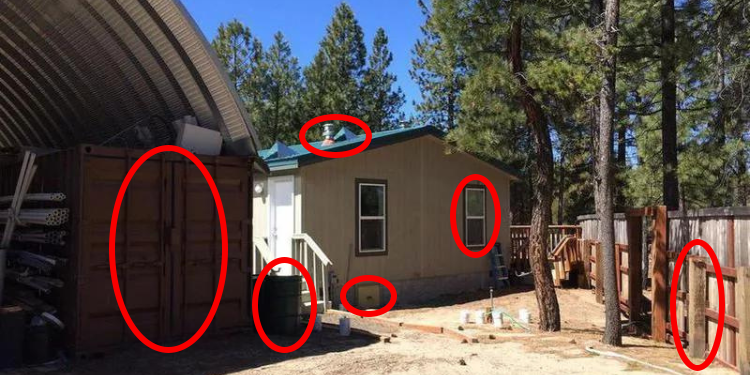
A nuclear attack or disaster will come without warning, and while it is not practical to harden your home against the shockwave and thermal blast of an atomic bomb, you can take steps to shield yourself and your family from the impending fallout.
A purpose-built fallout shelter is ideal but also prohibitively expensive and outside the reach of most of us. The good news is that we can take steps to secure our homes against fallout without digging a bunker in our backyard.
What Is Fallout?
Nuclear fallout is caused by the vaporized debris mixing with the radioactive particles that make up a mushroom cloud. The wind then carries this fallout downwind from the blast.
Related: A Strange Thing That Might Save Your Life in A Nuclear Aftermath
Fortunately, most of the fallout in the immediate area will fall within twenty-four hours and look like ash or sand.
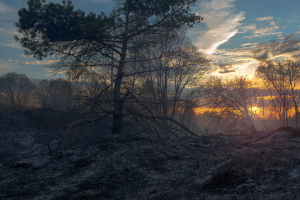
It can take months for all the fallout in the atmosphere to find its way to the ground, and the effects can be global. The problem with nuclear fallout is that its radiation comes from hundreds of radioactive nuclei with varying half-lives.
Some particles may have a half-life of a few days, and others may be decades.
This means that there is no good answer to the question of how long fallout will be dangerous, it depends on multiple factors. Since radiation has no taste or smell, only specialized equipment can detect how dangerous it is.
What To Do Immediately Following A Nuclear Detonation
It is unlikely that you will have any notice before an attack. Provided you survived the initial blast, you must seek shelter immediately.
If you are at home, you can execute your plan to set up refuge inside your home. If you are out and about, you’ll have about fifteen minutes to find shelter and avoid exposure to the fallout.
Immediately after entering the building that you will shelter in, close all the doors and windows and shut down any ventilation to prevent fallout particles from entering the building.
Close chimney dampers, seal bathroom exhaust fans and range hoods and close all furnace vents. Choose a room that is furthest away from the roof and the exterior walls, with the best option being to shelter in the basement.
Wherever you find shelter, it is essential to remain in place for at least 72 hours and to monitor the local radio stations waiting for the all-clear to be called.
Shielding Your Home
The best way to protect yourself from fallout is to construct a fallout shelter in your home that you can take refuge in after a nuclear strike.
⇒ How To Build An Underground Bunker For Only $400
Ideally, you’ll want to be inside a building made from concrete, but since most of our homes are constructed from wood, the next best thing is to modify a room within your home to act as a fallout shelter.
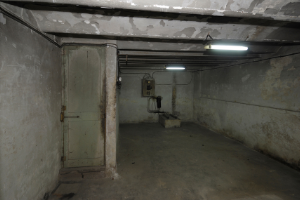
The best location is away from exterior walls and preferably underground.
A room in the basement near the center of your home will probably be the best location, with the next best thing being a room on the ground floor that is separated from the exterior walls of the house.
The first step is to reinforce the walls with thick heavy materials, which will block the radiation that the fallout brings.
Brick, sandbags, and cinderblocks are all excellent options, but you will need to account for the weight of these materials as you plan your shelter, especially if it is not in the basement.
Your fallout shelter should have enough food, water and supplies for a minimum of one week for yourself and your family.
Also, include entertainment options to pass the time while you wait for it to be safe enough outside to venture out of your home.
It is imperative that you have a battery-operated radio so that you can keep in touch with what is happening in the area and get word on when it is safe to exit your home.
Because of the EMP that a nuclear weapon generates, you need to secure any electronics you want to use in a Faraday cage to protect them.
⇒ Learn How An EMP Will Affect Your State
Decontamination
One of the often-overlooked considerations is establishing a decontamination area for those who come into the building from outdoors. You’ll need to create a space sealed from the rest of the home where a person can remove all their contaminated clothing.
You must provide a sealed container to store the contaminated clothing items so that you can safely isolate them from the rest of the people sheltering in the house.
You will then need another space to wash all the fallout on the skin and in the hair. Finally, there should be a clean space where they can dress in new clothes and enter the building.
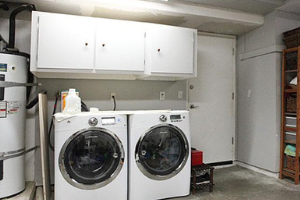
Areas in a home such as garages, mud rooms, or laundry rooms are good options for decontamination areas.
Heavy plastic sheeting such as vapor barrier would be an excellent choice to keep any fallout particles contained, but plastic painter’s drop cloths are also a good option.
After the area is used to decontaminate, the plastic can be taken down carefully, so the fallout is contained and then disposed of in large garbage bags. Make sure to mark the bags and store them as far as possible from your shelter area.
Building A Fallout Kit
In addition to food and water, you’ll need to stock some essential supplies to guard against the effects of radioactive fallout.
The first is to have a kit standing by to construct your decontamination area. Items to include would be: plastic sheeting, duct tape or tuck tape, contractor-sized garbage bags, five-gallon pails, coveralls. large wet wipes. soap, towels, and wash basins, exhaust fan.
Personal protective gear is also critical and should consist of:
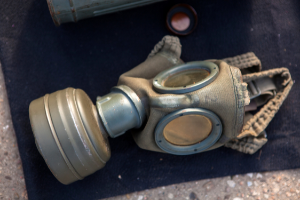 Disposable coveralls or a Hazmat suit rated for exposure to radiation
Disposable coveralls or a Hazmat suit rated for exposure to radiation- Full-face respirators or gas masks rated for radiation
- Respirator canisters rated for radiation
- Potassium iodine tablets
- Radiation detectors
You will also need to consider having an extensive first aid/trauma kit on hand because of the injuries that a nuclear attack will bring. It would help if you also educated yourself on the signs and symptoms of radiation poisoning and treatment options.
Being in the vicinity of a nuclear blast or accident can seem like a situation that is without hope, but the truth is that if you are alive after the explosion, there is a good possibility that you can stay safe and healthy as long as you shelter immediately when a nuclear weapon detonates, or there is a nuclear accident.

